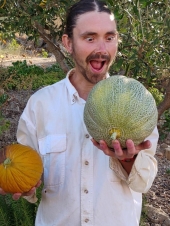
 8
8




“Peace is not absence of conflict, it is the ability to handle conflict by peaceful means.” —Ronald Reagan
Located in Western West Virginia



 7
7




Outdoor and Ecological articles (sporadic Mondays) at http://blog.dxlogan.com/ and my main site is found at http://www.dxlogan.com/
 5
5




Cindy Haskin wrote:I think as a whole, many of us have lost the skills needed to survive outside our small circles.
"Our ability to change the face of the earth increases at a faster rate than our ability to foresee the consequences of that change"
- L.Charles Birch
My Herbal Tea Store (CA)
 10
10




I want to be 15 again …so I can ruin my life differently.
 10
10




 1
1




“Peace is not absence of conflict, it is the ability to handle conflict by peaceful means.” —Ronald Reagan
Located in Western West Virginia



 7
7




 3
3




 5
5






 7
7




Homesteading skills needed to be successful

"We're all just walking each other home." -Ram Dass
"Be a lamp, or a lifeboat, or a ladder."-Rumi
"It's all one song!" -Neil Young
 1
1
















 5
5




Blog: 5 Acres & A Dream
Books: Kikobian Books | Permies Digital Market




 1
1








I want to be 15 again …so I can ruin my life differently.
 2
2




I want to be 15 again …so I can ruin my life differently.
 3
3




 2
2




I want to be 15 again …so I can ruin my life differently.
 1
1




Andrea Hicks wrote:D Logan: your summary of skills was spot on, except one point I strongly disagree on: reducing tree saps. Here’s why: trees that produce sugar sap take literally years to grow to a harvestable size. Add to that the fact that many regions of the world don’t have the right climate to grow trees that produce a significant amount of syrup. Finally, even if you were to buy a property with a large grove of syrup trees, or plant a large grove of syrup trees, they would take up a huge space that you could be devoting to more productive pasture or garden. I would, instead, encourage them to learn beekeeping, or even to grow sugar beets (or cane in some areas) over tree syrup.





John F Dean wrote:Hi Joshua,
I have minimal mechanical skills. I consider it to be a severe shortcoming. I can change the oil and do some basic trouble shooting. For anyone without the basic mechanical skills, I would suggest a community college class in small engine repair.
 1
1




Outdoor and Ecological articles (sporadic Mondays) at http://blog.dxlogan.com/ and my main site is found at http://www.dxlogan.com/
 1
1




I want to be 15 again …so I can ruin my life differently.
 1
1




Saepe Expertus, Semper Fidelis, Fratres Aeterni
De Opresso Liber
Trim sends
//BT//
 1
1




"Also, just as you want men to do to you, do the same way to them" (Luke 6:31)




I want to be 15 again …so I can ruin my life differently.






 2
2




John F Dean wrote:Hi Inge,
Indeed access to stores, hospitals, community, and cities were all factors when I selected my present location. I want to be isolated, but only to a point. That said, I do enjoy picking up skills along the way that enhance my independence.
"Also, just as you want men to do to you, do the same way to them" (Luke 6:31)




I want to be 15 again …so I can ruin my life differently.
 2
2




Cindy Haskin wrote:
But how will I have clothes that need washing if I have no cloth!?
Check out the plans to build your own charka-style spinning wheel from bicycle parts
Explore the intersection of permaculture, community, and the cycle of life at Herland Forest Natural Burial Cemetery and the Windward Education and Research Center
 4
4








Real funny, Scotty, now beam down my clothes!
 1
1




Dennis Barrow wrote:Homesteading skills to be successful...
With Permies.com, the internet and I looks like you have the will to do it, so just do it.
(I admit I didn't read the entire post as it was way to long. Sorry)
“Peace is not absence of conflict, it is the ability to handle conflict by peaceful means.” —Ronald Reagan
Located in Western West Virginia



 2
2




Nicole Alderman wrote:Another interesting thing about cloth is that--if made well and sewed together well--will last generations. In the medieval/Tudor times, clothing was actually recorded in wills as to who got what clothing. This is a testament not just to how long-lasting even underclothes were, but also how much work goes into making cloth (hours and hours of tending the sheep/flax, carding, spinning, weaving/knitting, sewing).
I think one thing we can do right now is invest in high quality fabrics/clothing and learn how to mend them effectively. Chances are, if things go waaay down hill, we won't have time to make much new cloth unless we specialize in it's production.
 6
6




 3
3




-- Tammy

 1
1




John F Dean wrote:I am having some trouble replying because I suspect our core premises differ as well as some of our definitions. I have been homesteading since the early 80s. I see homesteading as a process. When I think in terms of needed skills, I tend to think of an open mind and a willingness to learn. If I had a list of skills I needed to homestead, I never would have started. I can certainly think of many skills I have learned and more I would like to learn. But these are skills I did not need to begin to homestead. And, because I see homesteading as a process, I am comfortable knowing I will never be successful. There will always be new skill sets to acquire. Therefore, there is no finish line where I can identify that success has been achieved.




 1
1




 2
2




Cindy Haskin wrote:
Dennis Barrow wrote:Homesteading skills to be successful...
With Permies.com, the internet and I looks like you have the will to do it, so just do it.
(I admit I didn't read the entire post as it was way to long. Sorry)
And the reason the post was so long is because there are so many things to know and do on a homestead, but I didn't even cover half. And I've not even arrived on the property.
Thank you everyone for valuable input.
Real funny, Scotty, now beam down my clothes!
 2
2





| I agree. Here's the link: http://stoves2.com |


